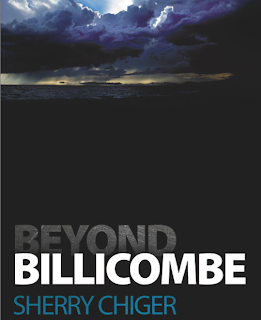My novel Beyond
Billicombe is in print and also available as an ebook (go ahead, buy it
now; I’ll wait). Three years after I
wrote most of the first draft during a three-week blitz at my home in Devon
while my husband and daughter were visiting the States, then finished the draft
and began revising it during weekly sessions in a friend’s supposedly haunted
attic, finally polishing it upon my move back to Connecticut, it’s for sale and
waiting to be read.
I should be elated, right? And part of me is. But that
excitement is battling it out with a gnawing anxiety that has teamed up with a
shadow of sadness, and so far the excitement is coming out the loser.
Bear in mind that I’m an obsessive-compulsive dysthymic. Rather than relishing any accomplishment or stroke of good fortune, I
automatically think, What now?
followed by So what?
What now? Now I
have to convince people to read the book: flog it to bloggers, tout it via
social media, beg folks to leave a review on Amazon. All things that I don’t
really enjoy doing. I enjoy writing, not promoting.
And so what?
Thousands of books are published every week. All the energy and time I devoted
to Beyond Billicombe—beyond the immense
pleasure it gave me, does it really matter?
Especially if no one else gets the same pleasure from it?
Aside from a few agents, who praised the writing but felt
the manuscript wasn’t something they could sell, nobody has read all of Beyond Billicombe but me. My husband has
been stalled at chapter eight for months. (“It’s good, I like it, I’m just not
a fiction reader.” Then again, he hasn’t even bothered to look at the images of
the book cover that I posted here and on Facebook weeks ago, so it’s safe to
assume his lack of interest is no reflection on the quality of my work.)
I obviously think Beyond
Billicombe a well-written, absorbing, moving story, better than at least a
few other books I’ve read this year, but what if nobody else does? What if I’m
deluded, in the same way that a doting mother is convinced her child is
precocious and adorable, when in reality the sprog is an unattractive,
unexceptional bundle of drool and dribble? (Two other novels I’ve written in
the past few years have a schizophrenic as one of the protagonists, so
delusions are something I spend a great deal of time obsessing about.)
And back to what now?
I feel a bit like Jax, the missing brother of Suzanne, one of the
protagonists of Beyond Billicombe. The last time she saw him, he’d been in rehab and sober for
several months. But he doesn’t see getting straight as a crowning achievement:
“Hear me out, okay? I’m not saying this to
get a rise from you, I’m not saying this because I’m feeling sorry for myself.
I’m saying it because it’s true, for me.” [Jax] turned toward [Suzanne]. His
face was all sharp, piercing angles, and his skin sheer enough to be bruised by
a gust of wind. “I don’t want you feeling, I don’t know, guilty. Or angry. But
the thing is, I could get out of here tomorrow, stay sober the rest of my life,
and I could never catch up with you. Or undo the shit I’ve done.”
“It’s not a competition.”
He took a last drag, then pinched the lit
end of the cigarette between his fingers before putting the stub in his front
jeans pocket. “I know that, here.” He rapped the side of his head with his
fist. “But not in here.” Now he thumped his chest.
“Jax, if you stayed sober, that would be
better than anything I could do.”
He lifted one corner of his mouth. “For me,
yeah. But let’s face it, most of the world manages not to become junkies or
drunks, and they don’t walk around expecting praise for it.” He mustered a
grin. “Obviously this is something I still need to work on.”
And at
another point, when Suzanne found Jax using after months of being straight:
“Zee,”
[said Jax, calling Suzanne by a childhood nickname,] “remember when I told you
to start caring a little less? This is why.”
“I can’t.”
“You have
to. Because I can’t stop.”
“Come on, you did. You were clean for
months. What happened?”
He shook his head. His hair hung lank,
hiding his face from her. “Nothing
happened. That’s just it.”
She crouched beside him, softened her voice.
“What do you mean?”
“I mean,
nothing happened. One day became another. I didn’t drink. I didn’t use. And I
didn’t do much of anything else.” He paused. She waited.
I wrote my
book, it’s published, and now, aside from getting the word out, I can’t do
anything else with Beyond Billicombe.
I love the finished product, I loved getting to know the characters, I loved
lavishing hours piecing together the right words to best get their story
across. But now it’s over.
Maybe what
I’m really feeling right now is mournful. The writer’s equivalent of empty-nest
syndrome.
Which means
filling the nest again—in this case, answering what now? by plunging into the next book, and ignoring so what? altogether.



